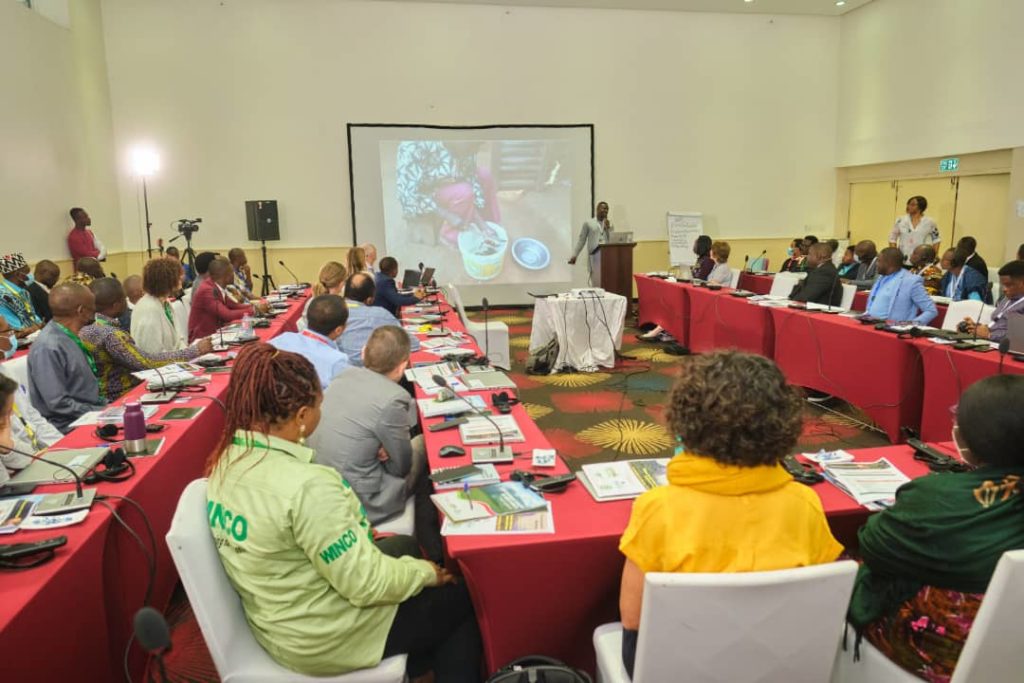Guinean forests of West Africa biodiversity hotspot: CEPF evaluates 6-year investments

For three days, June 6-9, 2022, over 80 delegates from Civil Society Organizations(CSOs) implementing various conservation programs in the Guinean Forests of West Africa biodiversity hotspot (GFWA) met with partners and funders in Accra, Ghana in the final assessment workshop to showcase the impacts of six-year investments by the Critical Ecosystem Partnership Fund (CEPF).
Speaking at the opening ceremony on Tuesday, June 07, CEPF’s Executive Director, Olivier Lagrand thanked grantees for what they are doing to conserve biodiversity. ” The appreciation and thanks have often gone to the funders for making the grants available but I think it is time to redirect our thanks to the grantees because, without them, our work will have no meaning,” Mr. Lagrand said.
Despite being one of the 36 globally recognized biodiversity hotspots in the world, the GFWA suffers immense pressure “there is a lot of pressure on the resources be it forest resources, coastal resources, wetlands resources. That is why we are here in the Guinean Forest hotspots to ensure we provide the means to Civil society organizations to reduce the impact on biodiversity and ensure conservation is achieved,” Lagrand added.
For the last six years, 2016 to 2022, the international funding program of six major partners including but not limited to the world bank and the European Union, has invested 10.1 million USD through 78 grants to 62 organizations. Projects supported were geared towards four strategic directions notably empowering communities to better manage priority key biodiversity areas, mainstreaming biodiversity into public policies, improving conservation actions for endangered species, and building institutional and communication capacities of CSOs. What Peggy Poncelet, CEPF’s Grant Director believes has paid off. “Our action resulted in more than 1000 globally protected species being supported, the establishment of 16.2 million hectares of protected area amongst others”

Speaking at the workshop Jean-Baptiste Deffontaines, West Africa Sub Regional Office Head for Birdlife International reiterated why local communities need to be at the forefront of conservation ” At Birdlife we strongly believe local people working for nature in their own places produces the best results. What they need is empowerment to do so” Jean-Baptist highlighted.
Civil society leaders taking part in the workshop couldn’t agree more ” Financial support from CEPF has enabled my NGO, FODER to implement the Project to support the conservation and participatory management of the Tchabal Mbabo forest reserve in Cameroon’s Mayo déo division on the border with Nigeria. This project was an opportunity for us to mark our first steps in the field of conservation with an approach focused on improving the governance of protected areas, through better transparency and an effective participatory approach. We were able, in about 18 months to obtain the consent and commitment of populations and elites for the protection of biodiversity” Justin Kamga, Executive Director of Cameroon-based NGO explained.
From presentations to group working sessions and experience sharing, the workshop gave participants the possibility to share lessons learned and network.
To help the organizations better communicate the impact of their work, the Participants also benefitted from a presentation on Communication skills: An NGO’s perspective, presented by the Director of the Cambridge-headquartered Tropical Biology Association, Rosie Trevelyan. Ms. Trevelyan also highlighted the importance of building institutional capacities.
“For the last 20 years, I have been training and building the capacity of grassroots CSOs to help them implement biodiversity conservation projects, funded by partners like CEPF. I believe building institutional capacities of local organizations is key for conservation” She added.
Speaking at the three-day event in Ghana jointly organized by the Global Initiative For Food Security and Ecosystem Preservation (GIFSEP) and Tropical Biology Association with the support of Birdlife Africa, Mohamed Imam Bakarr, Lead Environment Specialist at the Global Environment Facility, GEF insisted on the need for robust action against climate change. “We need to step up our game because the effects of climate change will be very bad for the GFWA region” He also added that governments need to allocate more budget to address conservation issues.”
At the end of the workshop, CEPF Director hinted even though this phase of funding had come to an end, there is the possibility for a comeback as the group continues to raise funds for a 15-year plan of action.
By Regina Leke Tandag, Accra Ghana




